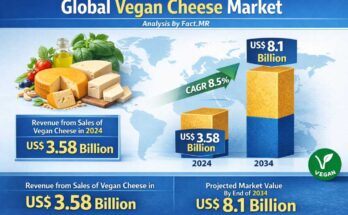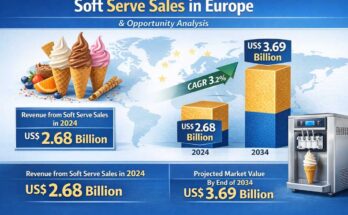The global taste modulation solutions market is poised for robust expansion, fueled by increasing demand for healthier food formulations, sugar reduction initiatives, and advancements in flavor science. According to a recent report by Fact.MR, the market is projected to grow from USD 1.2 billion in 2025 to approximately USD 2.6 billion by 2035, recording an absolute increase of USD 1.4 billion over the forecast period. This reflects a compound annual growth rate (CAGR) of 8.0% between 2025 and 2035.
As global consumers shift toward low-calorie, low-sugar, and functional food products, taste modulation solutions have become a critical component in maintaining palatability without compromising on nutrition. These technologies help mask bitterness, balance saltiness, and enhance sweetness perception in reformulated food and beverage products, supporting the clean-label and health-conscious movement.
Market Drivers: Sugar Reduction, Clean-Label Demand, and Functional Food Innovation
Rising Health Awareness and Sugar Reduction Initiatives
Governments and food authorities worldwide are implementing stringent regulations and health campaigns to combat obesity and diabetes. Taste modulation ingredients enable manufacturers to reduce sugar and salt content while retaining appealing flavors, helping brands comply with these mandates. Growing consumer awareness regarding the health risks of excessive sugar intake is accelerating adoption in the beverage, dairy, confectionery, and bakery sectors.
Clean-Label and Plant-Based Product Trends
The surge in clean-label and plant-based products is driving the need for natural taste modulators. Ingredients derived from botanicals, fruits, and fermentation processes are replacing synthetic flavoring agents, aligning with consumer demand for transparency and sustainability. Food manufacturers are increasingly investing in R&D to develop innovative taste solutions that enhance flavor without additives or artificial enhancers.
Technological Advancements in Flavor Modulation
Continuous innovation in flavor chemistry and biotechnology is revolutionizing the taste modulation industry. Advanced encapsulation methods, bio-based sweeteners, and precision fermentation are helping companies deliver targeted flavor profiles while maintaining stability and consistency. Integration with AI-driven formulation systems is further optimizing product development and reducing time-to-market.
Shift Toward Functional and Personalized Nutrition
Consumers are increasingly seeking personalized nutrition products that support wellness goals such as weight management, energy balance, and digestive health. Taste modulation technologies play a vital role in masking the off-notes of protein fortifiers, vitamins, and minerals in functional foods and nutraceuticals. This shift toward healthier indulgence is opening new opportunities for flavor solution providers across the global food and beverage industry.
Competitive Landscape
The taste modulation solutions market is characterized by the presence of leading global flavor houses and ingredient innovators focused on expanding their flavor portfolios, forming strategic partnerships, and investing in research for natural and sustainable solutions.
Key players include:
- Kerry Group
- DSM-Firmenich
- Symrise AG
- Givaudan SA
- Sensient Technologies Corporation
- Archer Daniels Midland Company (ADM)
- Corbion N.V.
- Carmi Flavor & Fragrances
- Flavorchem Corporation
- PureCircle Ltd.
These companies are actively introducing next-generation taste modulation systems targeting sugar, salt, and bitterness reduction, with applications spanning beverages, dairy, snacks, and pharmaceuticals. Collaborations with food tech startups and advancements in biotechnology are expected to further strengthen their market presence.
Recent Developments
- August 2025 – Givaudan SA launched a new natural taste modulation platform enabling sugar reduction of up to 50% in beverages without altering the sensory experience.
- March 2025 – Kerry Group expanded its flavor innovation hub in Singapore to accelerate the development of region-specific taste modulation systems for plant-based foods.
- November 2024 – DSM-Firmenich unveiled its next-gen bitterness masking solutions for nutraceuticals, designed to improve the taste profile of vitamin-rich and protein-fortified products.
Future Outlook: Natural, Functional, and AI-Enhanced Flavor Solutions
The next decade will redefine the taste modulation landscape, focusing on:
- AI-Enabled Flavor Design – Using machine learning to predict and optimize flavor interactions.
- Natural and Botanical Extracts – Sustainable and label-friendly ingredients for health-conscious consumers.
- Enhanced Applications in Functional Foods – Addressing the taste challenges in protein-rich and vitamin-fortified formulations.
- Global Accessibility – Expansion of modular taste solutions in emerging markets through regional production and partnerships.
By 2035, taste modulation solutions will be central to the food industry’s transformation—enabling manufacturers to balance health, flavor, and sustainability.



